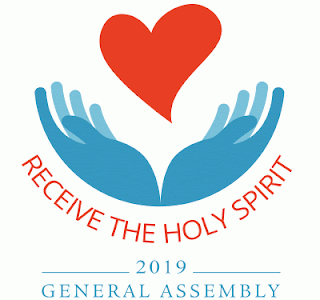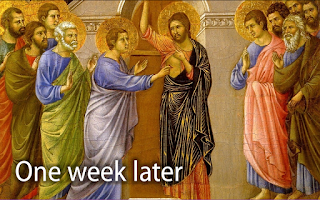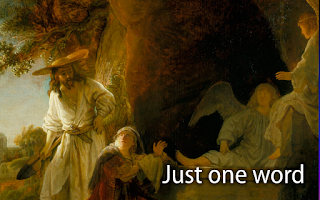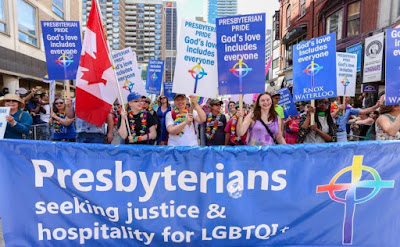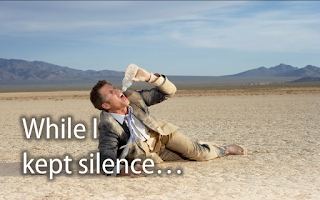Hespeler, 17 March 2019 © Scott McAndless – 2nd Lent
Genesis 15:1-12, 17-18, Psalm 27, Philippians 3:17 - 4:1, Luke 13:31-35
uring the season of Lent this year, I have noticed, a lot of our scripture readings take us into desert places. Last week we spent forty days and forty nights with Jesus in the wilderness as he was tempted. And I think you will find over the coming weeks that many other readings take us into the desert as well. The desert is a hard place to be, of course. With no food and water, you quickly become desperate. It is also far from human society and culture and that can be very hard for some. But there is also no question that the desert can be a profoundly spiritual place – a place where God seems nearer.
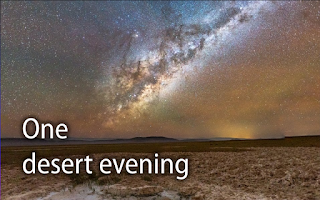
In our reading from Genesis this morning, the person we find in a desert place is none other than Abraham, the great father of our faith tradition. (In this text he is actually called Abram, but, since the story of how he changed his name really doesn’t have much to do with this particular passage, I’m going to ignore that and just call him by the name that we are used to.) But it is not just that Abraham is in a literal desert in this passage. I mean, he is. He seems to have pitched his tent in a very isolated place where there is nothing to interfere with him seeing all the stars in the sky and there are vultures and other things that prey upon dead things around him. But more than a literal desert, Abraham seems to have found himself in a spiritual desert.
How can I tell that? Well, look at how Abraham reacts when God comes to him and, in a vision, gives him an extraordinary promise. “Do not be afraid, Abram, I am your shield; your reward shall be very great.” I mean, that’s a pretty amazing thing for anyone to hear. The great creator of the universe comes to you and says that he has an enormous reward just for you! But how does Abraham react? The Book of Genesis puts his reaction kind of nicely, I mean, Abraham is one of the heroes of the Bible after all. “You have given me no offspring,” he says, “and so a slave born in my house is to be my heir.” But Abraham’s reaction is basically to say, “God, don’t talk to me about rewards. What good are your rewards if I don’t have any future?”
That is a pretty bleak place to be. Abraham is declaring that rewards, blessings and protection are absolutely meaningless to him because of something going on in his life. I mean, if I had friends who said that to me, I would be worried about them. That sounds like depression. And what has pushed Abraham into this spiritual desert? He actually has a great deal at this point. He is a very wealthy man according to the standards of his time and place. He has honour and respect from the people around him which, in that world, counted for even more. There were many who would have looked at Abraham and said that he had it all. So where does this discouragement come from? It comes from the simple fact that he sees no future.
Abraham sees no future because he has no children of his own. But his feelings are not just unique to him, I feel, nor even just to people who have dealt with the problem of infertility. I think a lot of people today are feeling that despair for the future. The current and ongoing environmental crisis certainly makes many people feel that way. The nuclear arms race has certainly had that effect on many as well. You can understand the feeling – what is the point of anything that I achieve or amass if there is not going to be anyone around in the future who can appreciate it?
Honestly, the church is feeling much the same thing in many places these days. The church has so much – such a powerful legacy that it has received from the past and so many vibrant ministries and beautiful buildings. But the church – and this is something that is true almost entirely across the board – is worried about the future. Every single denomination in Canada has suffered loss of membership in recent decades and, by far, the greatest loss has taken place in the youngest generations. The church is afraid that it’s losing its children and youth. That’s just the reality and everyone is talking about it. So, I think that Abraham could sympathize perfectly with the church today; we too are asking the question, what good are God’s promises and blessings if we don’t have children or youth to pass them onto?
Now, I would like you to note that all these dark and depressing thoughts that Abraham is having seem to happen in a particular place. He is inside. We only know that because at some point we are told that he goes outside but I think that his location is significant. It doesn’t say what he is inside, but I think it’s fair to assume, based on the rest of the story, that he is in a tent. So we have poor little Abraham, sitting in his tent in the desert feeling sorry for himself. He is surrounded, I’m assuming, by all his flocks and cattle, all the symbols of his great wealth and success, but, as he thinks of all that success, he cannot help but feel that it is meaningless because he has no children – because the future is dead and empty to him.
Often, honestly, that is exactly where the church is these days too – sitting inside our churches, surrounded by many blessings, but feeling sorry for ourselves because the future seems a bit bleak.
But then something prompts Abraham to go outside. In fact, not just something but someone. It says, “He brought him outside.” “He” refers, of course, to God. And, in many ways, I think that is the most significant thing that God does for Abraham in this whole passage. God takes him outside. And what is outside? Well, the desert is outside. Ah, but it is the desert at night that is outside the tent.
I wonder, have you ever been there – in a desert, far from civilization, in the middle of the night? I know that there aren’t too many deserts in Canada, but if you’ve been out in the Canadian wilderness someplace far from civilization – say in the middle of a Muskoka lake or in a clearing in Algonquin Park – you might have some sense of it. There, far from any artificial lights, there is only darkness. The only light comes from the stars and that light will completely blow you away. If you’ve only seen the stars in the city, I’m afraid that you have no idea. It’s not just the sight of those stars, it is the sheer uncountable abundance of them and the unfathomable space that they fill.
I don’t think that anyone has a simple response to such a sight. It doesn’t just send information to your eyes it speaks to your soul. You may be someone who has decided, based on logic and reason, that there is no God, but when you are staring at such a sight, you cannot just respond to it with logic and reason. It speaks to the heart and what it tells you is that there are things in the universe that are far beyond your logic and understanding.
So I, for one am not surprised that, when poor despondent Abraham lifted his eyes to the blazing glory that hung above that desolate place as he left his tent that night, God spoke to him – and Abraham received that as a much more hopeful word than he had heard inside. “The heavens are telling the glory of God; and the firmament proclaims his handiwork. Day to day pours forth speech, and night to night declares knowledge. There is no speech, nor are there words; their voice is not heard; yet their voice goes out through all the earth, and their words to the end of the world.” (Psalm 19:1-4) That was the voice that Abraham heard that night in the desert and it was the voice of God.
Now, the particular word of hope that Abraham received when he went outside was that God would grant him a child that would come from inside his own body. The incredible overhead display made that promise undeniable. The God who could arrange for such an incredible sight could surely not only grant Abraham just one heir – could grant as many as those uncountable stars that filled the sky. That was the particular message that Abraham received when he looked up, but I don’t think that is necessarily the entire message nor that that voice has since been silenced.
It makes me think of many people in the world today who are a lot like Abraham – people who have received many significant blessings and even protection from God but for whom those blessings mean little and may even be a reason for despair because they see no future. I have seen reports that the upcoming millennial generation in North America is, to an unprecedented degree, opting out of having children because they despair for the future given the promise of climate change and environmental destruction. They seem to have lost hope for the future. In these discouraging times, they are not alone.
And then there is the church which, as I said, seems to have a lot in common with Abraham as we contemplate the future. Yes, we have many blessings and even riches. Many flocks and herds surround our tent on every side, but we cannot help but ask the question, what does all this mean if we do not have a future, especially a future that includes a healthy population of children and young people?
Abraham’s story is extremely relevant today. And what do you think that God would say to us when we are feeling that way? I think that God would say, “Why don’t you go outside?” To the church, sitting inside of its magnificent buildings, God would say, “Go outside, I want to show you something.”
In many ways, that is what I think God is saying. God is telling the church, for one thing, that if we think we can just wait around inside our tent – just doing the things that are familiar and comforting to ourselves – and that eventually a younger generation is going to just show up, we are deluding ourselves. Can a younger generation show up in the church? Absolutely! But I will tell you that it is far more likely to happen when the church sets out from what is familiar and what feels safe and steps into the world outside the church in mission. But if we’re just sitting in our tents feeling sorry for our lack of future, why would God make that happen?
But even more important than that, stepping out of the tent means being willing to trust God enough to be people of faith in the big bad world. We’re told that when Abraham looked up and read the promise of God in the stars, “He believed the Lord; and the Lord reckoned it to him as righteousness.” God is looking for that kind of faith from us as well and will always reward it when he finds it in us.
Is there a future for humanity? For the planet? For the church? Do our fears concerning that future suck the meaning and joy out of the blessings of the present? If ever they do, remember that the future is and always has been in the benevolent hands of God. And God would not have us sitting inside our tents paralyzed and demoralized by fear of the future. God is inviting us outside, to consider the wonders of creation and the heavenly hosts. He is inviting us outside to trust him as we do the new thing, the risky thing, that we are called to do in the name of Christ Jesus.

